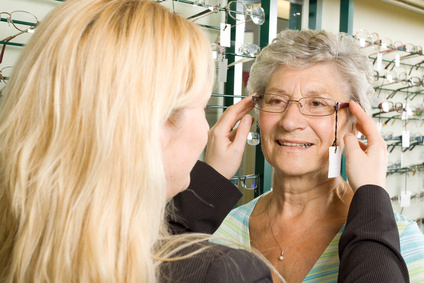Glaucoma is a group of eye conditions that can damage the optic nerve, leading to vision loss or blindness. It is often associated with increased intraocular pressure (IOP), but glaucoma can also occur with normal or low IOP.
Open-angle glaucoma (chronic glaucoma):
- Progresses slowly with subtle or no symptoms initially.
- Peripheral or side vision loss occurs first.
- Central vision may also be affected as it advances.
- Often termed the "silent thief of sight" due to stealthy progression.
Angle-closure glaucoma (acute glaucoma):
Find YOUR ideal care home NOW!
- Sudden and severe symptoms include intense eye pain, headache, nausea, vomiting, and blurry vision.
- Halos around lights may be observed.
- Vision deteriorates rapidly.
Normal-tension glaucoma:
- Resembles open-angle glaucoma but with normal intraocular pressure.
- Vision loss may occur without noticeable symptoms until late stages.
Causes of glaucoma:
- Elevated intraocular pressure (IOP) is a major risk factor, but not all cases are linked to high IOP.
- Primary damage occurs to the optic nerve, responsible for transmitting visual information.
- Risk factors include age, family history, race, and certain medical conditions like diabetes.
Glaucoma treatment options:
- Medications: Eye drops or oral medications reduce intraocular pressure by regulating aqueous humor production or drainage.
- Laser Therapy: Various procedures aid in improving fluid drainage, such as Laser Trabeculoplasty and Laser Peripheral Iridotomy.
- Surgery: Surgical interventions like Trabeculectomy and Minimally Invasive Glaucoma Surgery (MIGS) create new drainage channels or improve existing ones.
- Ongoing Monitoring: Regular eye exams are crucial for monitoring glaucoma progression and adjusting treatment accordingly.
Early detection is key:
Regular eye examinations are vital for early detection and effective management of glaucoma. Detecting the condition early enhances treatment efficacy and helps preserve vision. If you suspect glaucoma or are at risk, consult an eye care professional for personalized evaluation and treatment.
We're here to help:
It's crucial for individuals with glaucoma or those at risk of developing it to have regular eye exams to detect the condition early when treatment is most effective. Early detection and proper management can help preserve vision and prevent further vision loss. Please consult an eye care professional for a personalized evaluation and treatment plan if you suspect you may have glaucoma or are at risk.
Glaucoma Risk Factors and Treatment Options
| Risk Factors | Treatment Options |
|---|---|
| Age (higher risk after age 60) | Medications: Eye drops or oral medications to lower intraocular pressure. |
| Family history (genetic predisposition) | Laser therapy: Procedures like laser trabeculoplasty to improve drainage. |
| Ethnicity (higher prevalence in African, Asian, and Hispanic populations) | Surgery: Trabeculectomy or Minimally Invasive Glaucoma Surgery (MIGS) for drainage enhancement. |
| Medical conditions (e.g., diabetes, hypertension) | Ongoing monitoring: Regular eye exams to track progression and adjust treatment. |
| Previous eye injuries or surgeries | Lifestyle adjustments: Healthy diet, avoiding smoking, and proper eye care. |
FAQ: Understanding and Managing Glaucoma
-
What is glaucoma?
Glaucoma is a group of eye conditions that damage the optic nerve, often due to increased intraocular pressure. -
What are the early signs of glaucoma?
Open-angle glaucoma usually has no symptoms in early stages, while acute angle-closure glaucoma causes severe eye pain, blurred vision, and nausea. -
Who is at risk of developing glaucoma?
People over 60, those with a family history, individuals with diabetes, and certain ethnic groups (African, Asian, and Hispanic populations) are at higher risk. -
Can glaucoma be cured?
There is no cure, but early diagnosis and treatment can slow its progression and preserve vision. -
What treatment options are available?
Treatments include medications (eye drops), laser therapy, and surgery to reduce intraocular pressure and prevent further damage. -
How often should I get my eyes checked for glaucoma?
Adults over 40 should have an eye exam every 2-4 years, while those at higher risk should get checked annually. -
Can lifestyle changes help manage glaucoma?
Yes, maintaining a healthy diet, regular exercise, avoiding smoking, and managing other health conditions can help. -
Are there any symptoms of glaucoma I should watch for?
Peripheral vision loss, blurred vision, halos around lights, eye pain, and headaches can be signs of glaucoma. -
Is normal-tension glaucoma different from other types?
Yes, normal-tension glaucoma occurs despite normal eye pressure and requires close monitoring for effective management. -
Where can I get help in finding a care home for someone with glaucoma?
Our advisors at Senior Home Plus can assist in finding specialized care facilities. Contact us at 0230 608 0055 or fill out our form online for guidance.
We are here to help you choose a care home or facility best suited to your needs. Do not hesitate to contact us on the following number: 0230 608 0055 or fill out this form.


